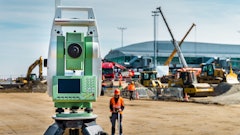
The construction industry is at a crossroads—demand for infrastructure and development projects continues to surge, while organizations must grapple with the persistent shortage of skilled workers. These factors can leave projects understaffed and behind schedule; both seasoned industry veterans and newcomers alike agree that the need for technological advancement in construction has never been more apparent. Manual back-office tasks, such as managing tickets and processing change orders, have long been the bane of project managers, causing frustration and delays to construction projects throughout the country. Fortunately, within the past seven years, a glimmer of hope has emerged in the form of digitization: a glimpse at the dawn of next-generation construction technology. Despite initial hesitation from pioneers in the sector, these modern tools bring the promise of revolutionizing the industry, offering construction professionals accurate risk assessments, streamlined workflows and newfound efficiency.
Attracting Talent Through Innovation
Construction, while essential, has struggled to attract fresh talent, burdened by its traditional image and outdated technologies. In a labor market rife with shortages, the industry must adapt to survive. By integrating technology, we can inject new life into construction, and make the industry more appealing and accessible to younger generations who already possess technological prowess as digital natives. Today's workforce demands efficiency and connectivity; both qualities that technology provides. The advent of data-rich mobile devices and the knowledge gap between field offices and job sites is narrowing, paving the way for seamless collaboration and real-time communication. Leveraging Artificial Intelligence (AI) can further amplify this transformation by offering accurate risk assessment and valuable insights to save time and resources for supervisors and managers.
Democratizing Access to Innovation
Despite the promise of technology, many small businesses within the construction sector struggle to access these tools due to learning curves and affordability constraints. Many executive leaders in construction, despite their expertise in the field, lack formal education in business efficiency and financial management. This disparity not only hinders individual companies but also impedes the collective progress of the industry. To truly propel construction forward, we must equip small and medium-sized businesses with the data and insights needed to make more informed decisions. By offering accessible tech solutions, we can bridge these knowledge gaps and foster a more competitive and dynamic industry landscape.
Empowering the Next Generation
It's imperative that we equip future construction workers with the tools they need to thrive, ensuring that their jobs are not only easier but also more fulfilling and fun. As the American workforce demographic evolves, a new generation of workers enters the fray, armed with a desire to revolutionize outdated industry practices. Gen Z and millennials have been raised in the digital age and crave real-time analytics and streamlined workflows to inform their decision-making. According to HP’s State of Construction Productivity survey, 66% of respondents believe that technology can help combat the labor shortage and attract the next generation of talent. By integrating technology into construction, we can both attract new talent and empower them to effect change – building tomorrow’s cities better.
Embracing Change for a Brighter Future
Recent years have seen a growing concern about the impact of technology on employment. However, in the realm of construction, human skills and ingenuity remain irreplaceable. While AI and automation may streamline processes, humans ultimately build and shape our cities. The construction sector is ready to confront the technology gap head-on, by embracing change as an opportunity for growth and innovation. By addressing issues such as slow communication and outdated practices, we pave the way for a brighter future: one where construction thrives through collaboration and innovation.
With only 3% of CIOs reporting the introduction of productivity-boosting technology on-site in the last 12 months, the time to act is now—the path to building tomorrow's cities better lies in reshaping construction tech. By leveraging innovation, we can overcome communicative and organizational challenges, attract new talent, and drive the industry into a new era of progress and efficiency. Together, we can bridge the technology gap and forge a future where construction is not just a job but a passion-driven pursuit of excellence.


























